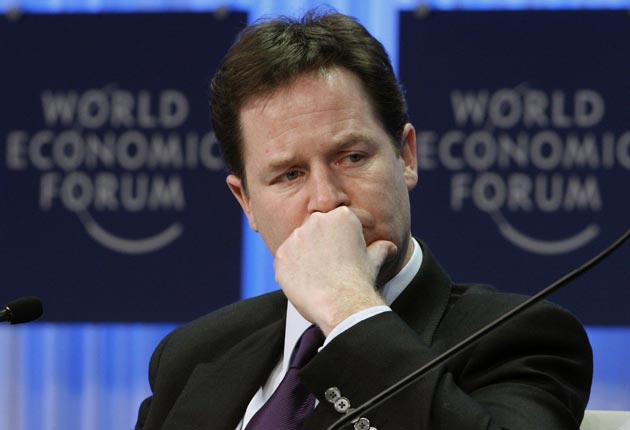Andrew Grice: David Cameron may oppose electoral reform, but his Coalition will struggle to survive a 'No' vote
Inside Westminster

Nine months on, the Coalition has entered a new phase. David Cameron and Nick Clegg have agreed that they no longer need to be "joined at the hip".
It goes wider than their disagreement over whether to change the voting system at general elections, about which they made speeches on opposite sides yesterday.
The two leaders have decided to express their own party's values more forcefully when speaking about government policies rather than try to sing from the same hymn sheet. Their gentlemen's agreement does not mean they will disagree publicly on anything other than electoral reform.
But they will say some things in their own way rather than always use similar language. They believe the Coalition has put down firm roots, despite the inevitable controversies, compromises and U-turns that afflict all governments.
Whatever the result of the referendum on the alternative vote (AV), the Coalition is not going to collapse. Their change of gear also reflects the troubles Mr Cameron and Mr Clegg have in their own backyards. A sizeable number of Tory MPs have not warmed to the new politics like the Cameroons. For them, the AV campaign is a painful reminder of Mr Cameron's failure to win an overall majority last year, and of the biggest concession to the Liberal Democrats during the horse-trading which followed.
When government policies are announced or changed, Tory traditionalists complain that the Liberal Democrat tail is wagging the Coalition dog, even when it is not. The problem is compounded now that, to reassure Liberal Democrats that they enjoy real influence, Mr Clegg is flexing his muscles in public.
He announced plans to ensure more students from poorer families get to university, which many Tory MPs dislike because it will be at the expense of privately educated children whose parents thought they had bought an automatic ticket to a top university.
Similarly, Mr Clegg regards Mr Cameron's flagship Big Society project as the PM's agenda rather than his. He won't rubbish it, but he is not going to be a cheerleader for it.
Although Mr Clegg accepts society has broken down in the most deprived areas, he doesn't believe that society as a whole is "broken", as the Prime Minister argues.
Senior Tories on the 1922 Committee executive suspect Dave will soft-pedal during the AV referendum to help his friend Nick, just as the Tories did in last month's Oldham East and Saddleworth by-election.
They are worried that the Cameroons want to prolong the Coalition and see the introduction of a preferential AV system as a means of entrenching anti-Labour tactical voting. Their fears are probably exaggerated.
When Mr Cameron said yesterday that "On this one, I don't agree with Nick", he meant it. There can be only be one winner in the referendum, and defeat would be hard for Mr Cameron. His Tory critics would brand him a two-time loser and government whips fear his already fractious parliamentary party could become even more difficult to manage if AV were approved.
In an attempt to survive at the next election, Tory MPs would put courting second-preference votes ahead of loyalty to the Government in Commons votes. Many eyes are already focused on local matters because the cut in the number of constituencies from 650 to 600 will start a scramble for seats, with some MPs left stranded in a game of musical chairs.
Cameron critics should be reassured by his speech yesterday. He was never going to launch a personal attack on his deputy. But he did recall that Mr Clegg had described AV as a "miserable little compromise", as it happens, in an interview with me two weeks before last May's election, when he was talking about Labour's manifesto pledge to hold an AV referendum.
At the time, it was a fair bet that Mr Clegg would be the face of the "Yes" campaign in such a referendum. Now he seems to be the face of the "No" camp because he is so unpopular. Funny game, politics.
Yesterday the Liberal Democrat leader dropped a section about trust in politics from his draft speech. It spelt trouble because of the loss of trust in him after his spectacular U-turn on university tuition fees.
One Liberal Democrat MP admitted after yesterday's speech: "Our big gun has fired. Now he should fall silent." Mr Clegg is relaxed about doing so. He is convinced the AV referendum can be won and, if he is getting in the way, he is more than happy to stand aside. If the plebiscite is lost, his Plan B is to press Mr Cameron hard for quick progress on an elected House of Lords, so the Liberal Democrats could still claim one big constitutional prize from their involvement in the Coalition.
Although the filibustering by peers over the AV Bill shows how hard it would be to get the Lords to effectively abolish themselves, Mr Clegg believes on balance that the late-night antics strengthen his argument for a largely elected second chamber.
Tory ministers have other ideas. Many do not want the two years before a 2015 election dominated by a parliamentary battle over Lords reform that would leave many voters cold.
If the AV referendum is lost, the special relationship between Dave and Nick may face its toughest test yet.
Join our commenting forum
Join thought-provoking conversations, follow other Independent readers and see their replies
Comments
Bookmark popover
Removed from bookmarks